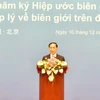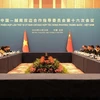Vietnam has affirmed its concrete policy of ensuring, protecting and promoting the legitimate rights of ethnic minority groups in all aspects, based on the principle of equality and solidarity for the common progress of all ethnic communities.
Speaking at a dialogue with independent experts on ethnic minority issues during the ongoing 25th session of the United Nations Human Rights Council in Geneva, the Vietnamese representative stressed that the country’s law and policy system is built to guarantee that the needs of ethnic groups are associated in all socio-economic development policies.
Since 2006, as many as 160 legal documents have been issued in such a direction, the representative noted, adding that Vietnam’s strategy on minority groups until 2020 has been approved and implemented with an aim of narrowing the development gap among ethnic minority communities based on sustainable development and the promotion of cultural values.
At the same time, Vietnam has paid special attention to the preservation and development of the cultural values and languages of ethnic minority groups, especially through education.
Since 2012, as many as 12 languages of ethnic groups have been taught at schools in 32 cities and provinces nationwide, the representative said.
With the support of UNICEF, the Ministry of Education and Training has conducted a pilot bilingual education model, teaching in both Vietnamese and the mother tongues of ethnic minorities in some localities, which is expected to be expanded in the future.
The representative also praised the contributions by independent experts as well as the efforts of different governments in preventing discrimination and inequality, and their positive impact on the enjoyment of ethnic groups’ fundamental rights.
The official held that the main purpose of the UN’s relevant mechanisms is to encourage dialogue and cooperation to ensure the basic rights of ethnic groups, contributing to the struggle against racial discrimination.
At a meeting on the rights of people with disabilities, Vietnam hailed UN agencies as well as the international community for their support to the disabled in equally participating in and enjoying their rights, especially to education.
Over the past years, despite many difficulties, the Vietnamese Government and people have spared no effort to assist disabled people in getting better access to human rights, including the right to education.
Wars have burdened Vietnam with a large number of disabled people. The representative said Vietnam hopes to continue receiving more support and positive cooperation from all nations and international organisations, backing Vietnam in optimising disabled people’s access to human rights, especially education.
The official also reaffirmed the commitments and efforts of the Vietnamese Government in promoting the rights of disabled people, including its attempts to join the UN Convention on the Rights of Persons with Disabilities, and the approval of a proposal on supporting disabled people in the 2010-2020 period.
Vietnam , running for membership of the UN Human Rights Council in the 2014-2016 tenure, voiced 14 voluntary commitments, including important promises on the building of policies and resources for the guarantee of social welfare and rights of vulnerable groups such as ethnic minorities, the handicapped, women and children.
Vietnam is also finalising its procedure for the ratification of the UN Convention on the Rights of Persons with Disabilities.-VNA
Speaking at a dialogue with independent experts on ethnic minority issues during the ongoing 25th session of the United Nations Human Rights Council in Geneva, the Vietnamese representative stressed that the country’s law and policy system is built to guarantee that the needs of ethnic groups are associated in all socio-economic development policies.
Since 2006, as many as 160 legal documents have been issued in such a direction, the representative noted, adding that Vietnam’s strategy on minority groups until 2020 has been approved and implemented with an aim of narrowing the development gap among ethnic minority communities based on sustainable development and the promotion of cultural values.
At the same time, Vietnam has paid special attention to the preservation and development of the cultural values and languages of ethnic minority groups, especially through education.
Since 2012, as many as 12 languages of ethnic groups have been taught at schools in 32 cities and provinces nationwide, the representative said.
With the support of UNICEF, the Ministry of Education and Training has conducted a pilot bilingual education model, teaching in both Vietnamese and the mother tongues of ethnic minorities in some localities, which is expected to be expanded in the future.
The representative also praised the contributions by independent experts as well as the efforts of different governments in preventing discrimination and inequality, and their positive impact on the enjoyment of ethnic groups’ fundamental rights.
The official held that the main purpose of the UN’s relevant mechanisms is to encourage dialogue and cooperation to ensure the basic rights of ethnic groups, contributing to the struggle against racial discrimination.
At a meeting on the rights of people with disabilities, Vietnam hailed UN agencies as well as the international community for their support to the disabled in equally participating in and enjoying their rights, especially to education.
Over the past years, despite many difficulties, the Vietnamese Government and people have spared no effort to assist disabled people in getting better access to human rights, including the right to education.
Wars have burdened Vietnam with a large number of disabled people. The representative said Vietnam hopes to continue receiving more support and positive cooperation from all nations and international organisations, backing Vietnam in optimising disabled people’s access to human rights, especially education.
The official also reaffirmed the commitments and efforts of the Vietnamese Government in promoting the rights of disabled people, including its attempts to join the UN Convention on the Rights of Persons with Disabilities, and the approval of a proposal on supporting disabled people in the 2010-2020 period.
Vietnam , running for membership of the UN Human Rights Council in the 2014-2016 tenure, voiced 14 voluntary commitments, including important promises on the building of policies and resources for the guarantee of social welfare and rights of vulnerable groups such as ethnic minorities, the handicapped, women and children.
Vietnam is also finalising its procedure for the ratification of the UN Convention on the Rights of Persons with Disabilities.-VNA



















